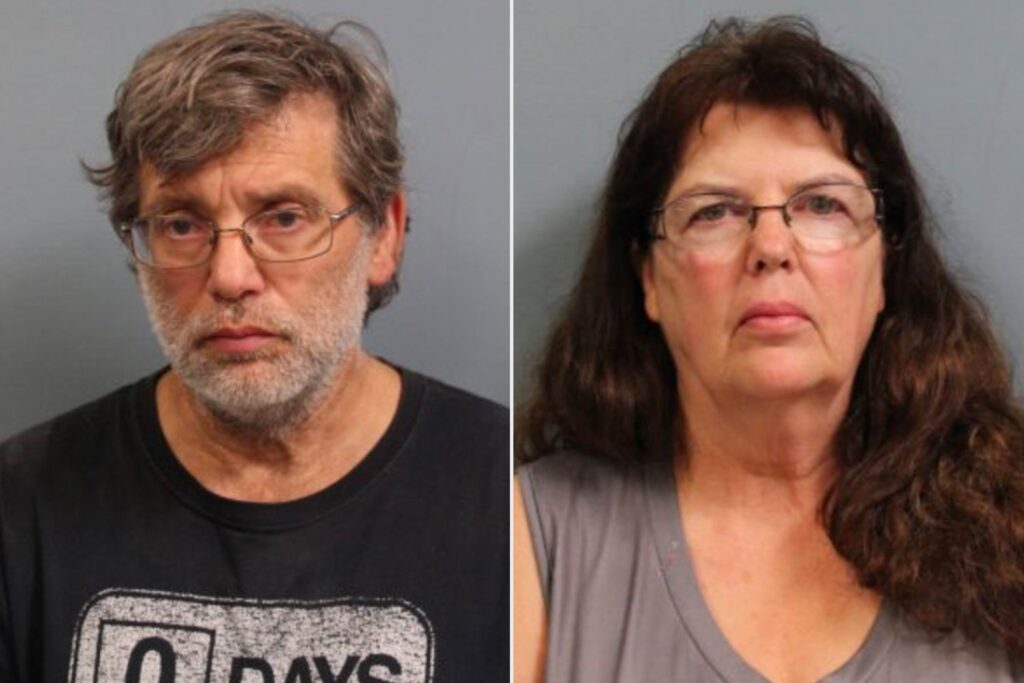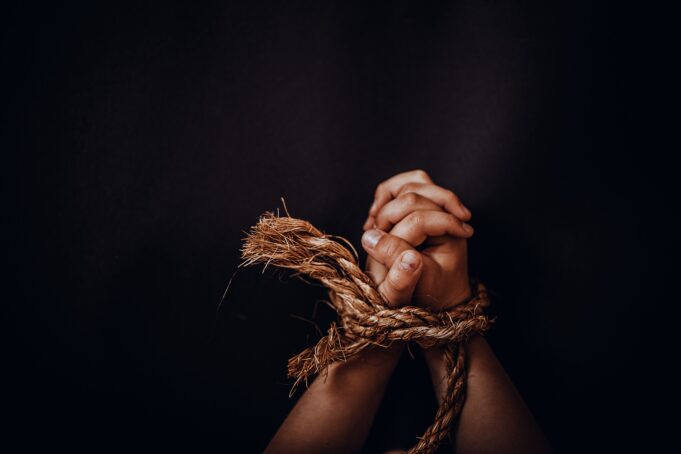A White couple charged with human trafficking, forced labor, child neglect, and civil rights violations of their five adopted Black children from a homeless shelter will face trial in West Virginia on September 9.
Jeanne Whitefeather, 62, and Donald Lantz, 63, were arrested on felony charges of gross child neglect creating a substantial risk of injury and are currently held at South Central Regional Jail in Kanawha County on $500,000 cash bail.
The children were placed in Child Protective Services custody.
The couple was indicted on charges of human trafficking of a minor child, civil rights violations based on color, race and/or ancestry, use of a minor child in forced labor, child neglect creating a substantial risk of serious bodily injury or death, and false swearing.
Circuit Judge MaryClaire Akers said the 16-count indictment alleged the children’s “use as, basically, slaves,” and she expressed shock after a grand jury indicted the couple in May, according to a WCHS-TV Charleston, Virginiareport. The judge increased each of the defendants’ initial $200,000 bond, ruling that it was insufficient, saying that Ms. Whitefeather was a flight risk because she had no relatives in West Virginia or connections to anyone in the community.
“I don’t think I’ve ever seen an indictment like this in all of my time,” said Judge Akers at a June 11 arraignment, during which the couple entered not-guilty pleas.
Kanawha County Sheriff’s deputies found the four children at the couple’s home in Sissonville, in October 2023, after receiving a 911 call about the children’s welfare, according to a press release. Sissonville is located about 14 miles from the state capital of Charleston. According to the U.S. Census, Sissonville has a population of about 2,680 and 98 percent White.
A nightmare
Deputies had to force entry into the barn where they located a juvenile male and juvenile female locked inside an approximate 20 x 14-foot room. “The children had no means to exit the barn on their own, no running water, no bathroom facilities, and were obviously deprived of adequate hygienic care and food.
At the main residence, deputies located another small child locked inside alone. The child was observed in an unprotected loft, approximately 15 feet high,” read a news release from the Kanawha County Sheriff’s Office.
The two children in the barn, ages 14 and 16, stated that they were locked inside for nearly 12 hours when they were found and forced into inhumane conditions. According to court documents, the children were forced to sleep on the hard concrete floor, extremely dirty, had a strong body odor and the 14-year-old had “open sores on his bare feet.”
According to the Sheriff’s Department, the children described consistent abuse suffered from their “parents” at the West Virginia home and the couple’s other residence in Washington state.

A criminal complaint in the case indicates a 911 caller told dispatchers they believed the children were locked in the barn for days at a time, according to WCHS-TV.
The caller later told deputies they’d seen Mr. Lantz open the door to the barn, say something to the children, and then close and lock the door back. The caller also alleged the children were made to do farm work and not allowed in the home.
Further, Deputy H.K. Burdette, reportedly said he knocked on the shed’s door on Oct. 2 and that the teenage girl inside indicated she was unable to open it.
After deputies forced their way in, the girl said the defendants had brought food to her and her brother early that morning and that they had been inside for about 12 hours with no contact from the couple. The girl also said she and her brother were not allowed inside the house and were “locked in the shed for long periods of time daily.”
“I was repulsed for, for the lack of a better term. As soon as the door was open, the heat from inside hit us. The smell made my eyes water. It was terrible without running water, circulating air, or beds,” said Deputy Burdette, according to the criminal complaint.
At the June 11 arraignment, Mark Plants, attorney for Ms. Whitefeather, referred to the shed as a “teenage clubhouse,” saying a key was inside, according to WCHS-TV. He called the ordeal a “plain and simple misunderstanding,” the outlet reported.
Prosecutors have stated they reportedly have a significant amount of evidence that shows that the couple moved from Washington after they were under investigation for abuse and neglect there.
Kanawha County Assistant Prosecutor Chris Krivonyak has said the couple sold an 80-acre ranch for $725,000 in Tonasket, Washington, and in March 2023, they sold the Sissonville home for $295,000.
Those funds are subject to state seizure, because the couple’s five adopted children were at both properties during periods of alleged human trafficking, according to CBS affiliate WOWK-TV.
The Final Callreached out to Kanawha prosecutors for an interview and was told by a receptionist to email Debra Rusnak, the lead prosecutor. As of presstime, no response has been received.
Systematic problems
This case, like many others, highlights systemic racial dynamics in the adoption system, explained Houston-based attorney Sadiyah Karriem.
“To begin, there has to be stricter screening procedures in adoption agencies immediately, particularly when it comes to adoptions, especially transracial adoptions, as this instance shows,” she continued.

Adoptive parents should be thoroughly vetted and closely monitored to prevent the exploitation of children and the sufficiency of the follow-up protocols and the accountability of the agencies responsible for the placement of these children are called into doubt, Atty. Karriem added.
“Foster care is home to an alarmingly high number of Black children, and many families view these children as less ideal candidates for adoption,” she said. Atty. Karriem understands the dynamics because she not only grew up in foster care, she eventually adopted four children.
“There is a shortage of accessible, willing, and competent adoptive families, which can put children in potentially dangerous circumstances, all because of racial disparity. To stop this kind of abuse from happening, the child welfare system must confront its persistent racism,” Atty. Karriem told The Final Call.
She added, “More Black families stepping up and adopting Black children is desperately needed. Adopting our own will allow us to create safe, loving, and culturally affirming homes. Our community has to participate actively in raising our children so they may grow up with a strong feeling of identity, belonging and security.”
Katonya Hart is co-founder of Black Policy Day, which she created to help empower Black people. The Charleston, West Virginia-based advocate also raised serious questions and concerns about the case.
“These two people moved from another state here with the children and as much as the system here is in need of review … what about that other state that allows them to receive the children, then leave, and come here? What kind of review and research was happening there?” she questioned.
Meanwhile, separately, in a federal class-action suit accusing the state of failing to protect children and fix its overwhelmed foster care system, a judge ruled in February that Child Protective Services failed to adequately investigate what happened with the children, saying they were left to suffer at the hands of their adoptive parents for months, reported WCHS-TV.
Reportedly, lawmakers in Washington state divided the Department of Health and Human Resources—which had been overseeing the foster care system—into three parts/divisions in January to improve transparency and results.
Still, there is no monitoring or real follow-up on the children, and data is almost unheard of, said Darryl Clausell, former president of the West Virginia NAACP. The state’s foster care and child welfare system have problems and is considered one of the worst in the country, he told The Final Call.
He shared that recently, he advocated for a young man who was reportedly separated from his three siblings. There were two sisters and two brothers who wanted to be together. “They put three kids in one place, and left one young man with this White family, and it was being fought against.
I was trying to be his advocate and it was just no win. The judge was literally going to rule that this White couple take this kid regardless of the facts,” stated Mr. Clausell.
“There’s just so many instances where it’s all over the state and this is just one that made the news, that’s all,” he added.
Foster care failures
This recent case in West Virginia raises several questions, including: when were the children first placed with Mr. Lantz and Ms. Whitefeather, were they ever in foster care, when was the adoption completed, what happened to the children’s parents and were there other family members or relatives they could have been placed with? How did this failure fly under the radar?
The negative impact Black children and families endure in America’s foster care system is deeply troubling, advocates point out.
In April, Richard Wexler, executive director of the National Coalition for Child Protection Reform, dubbed West Virginia the “child removal capital” of America. He stated that he has followed the harm done to children by America’s child welfare systems for nearly half a century, first as a journalist, and now as an advocate.
“In all that time, I have never encountered a state so mind-bogglingly fanatical about tearing apart families that even foster care agencies think it’s too much—until now,” wrote Mr. Wexler in a column, titled, “West Virginia child removal capital of America”published online in the Fayette Tribune on April 18.
Mr. Wexler explained that in 2022, the most recent year for which comparative data are available, West Virginia took away proportionately more children than any other state—even when rates of child poverty are factored in. West Virginia’s rate of sundering families was more than quadruple the national average.
“Looked at another way: In 2022, 185,600 were taken from their homes and 366,400 were stuck in foster care on any given day. Had every state been like West Virginia, 930,000 children would have been torn from their parents in 2022 alone,” he said.
Mr. Wexler, argued that it’s no surprise that West Virginia uses what is, by far, the worst form of placement, group homes and institutions, at a rate more than 50% above the national average. “In West Virginia, almost every Black child is born with a target on his back.
Nearly one-third will be placed in foster care at some point before they turn 18. (It will happen to 17% of White children and 14% of Black children will have the right to live with their own parents taken from them forever),” he wrote.













